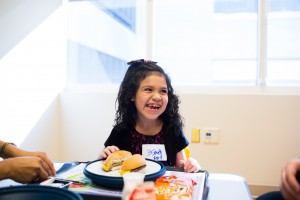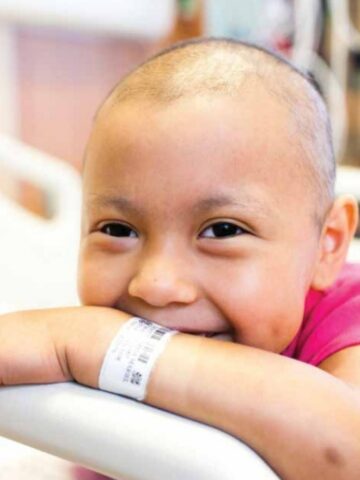The nationally recognized CHOC Multidisciplinary Feeding Program continues to grow in both size and prominence. A recent study published in the Journal of Pediatric Gastroenterology and Nutrition showed that 90 percent of patients admitted into the hospital’s 19-day inpatient program for serious feeding disorders were successfully weaned from gastrostomy tube feeding by discharge.
Demand for the CHOC Multidisciplinary Feeding Program — the only one of its kind on the West Coast — continues to grow. The program, which is known for providing a positive, holistic approach to feeding disorders, receives referrals from throughout the country and recently moved into an expanded treatment space on the third floor of the CHOC North Tower. In June 2015, a third team of physicians, nurses, nurse practitioners, occupational therapists, speech pathologists, social workers, developmental psychologists and dietitians will be added to the program.
CHOC has been presenting at medical conferences and publishing results in peer-reviewed journals for the last few years. In the June 2014 Journal of Pediatric Gastroenterology and Nutrition, the CHOC team showed how 90 percent of patients who had previously failed outpatient treatment were successfully weaned from gastrostomy tube feeding during the 19-day inpatient program. During that time, patients maintained weight and 83 percent remained fully weaned a year later.
Another study, which the team hopes to publish this year, found how the weaning process might be complicated by such underlying medical conditions as acid reflux, food allergies and gastritis. Of 65 patients evaluated for disordered eating or gastrostomy tube dependence without an explanation, 57 percent had an underlying gastrointestinal disorder:
- 31 percent had untreated acid reflux
- 14 percent had eosinophilic esophagitis
- 12 percent had gastritis
The study confirmed what pediatric gastroenterologist Dr. Mitchell Katz has suspected all along: Successful weaning requires a multidisciplinary medical and behavioral approach. 
“Children do not automatically grow out of severe feeding disorders, but they can get better with direction and guidance,” said Dr. Katz, who directs the program. “First, we work on resolving the medical part of the puzzle, and then we focus on the behavioral aspects and work through the child’s fear and anxiety. We only provide positive reinforcement.”
A parent is required to be present throughout the 19-day inpatient program, and receives parenting and behavioral skills designed to improve the quality of life for the entire family. The program’s expanded treatment space now includes two feeding therapy treatment rooms, plus a central area equipped with audio visual equipment, where families and staff may remotely watch therapy sessions in real time. The system also includes an audio feed, allowing therapists to provide advice and coaching when parents are alone in the room with their child.
Outpatient services are also available. For more information or to schedule an evaluation, please visit [email protected] or call (714) 509-4884.




